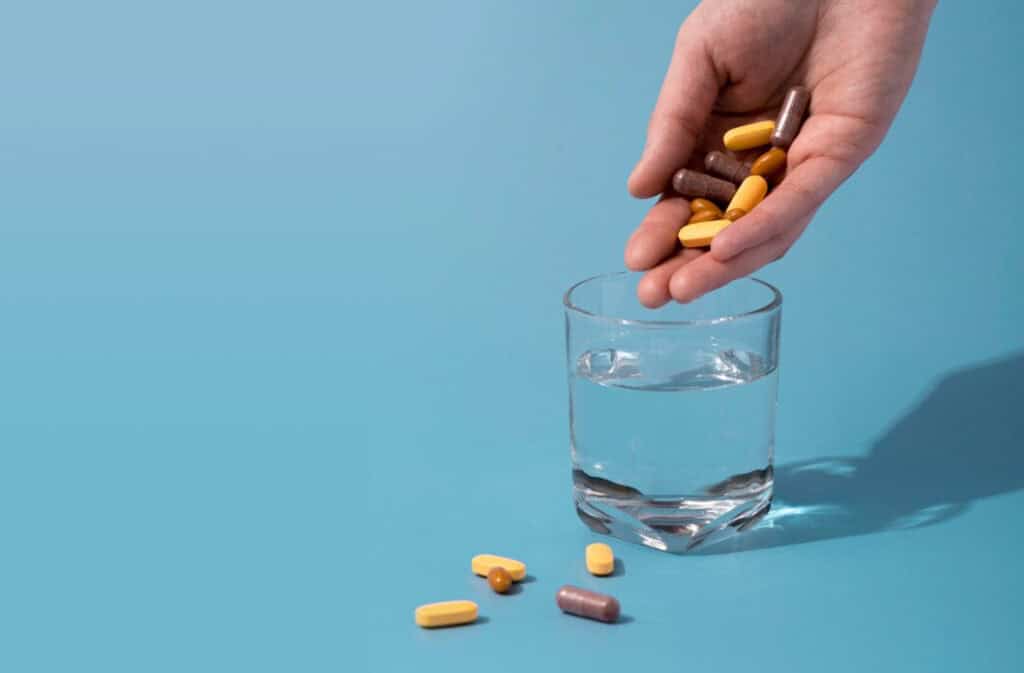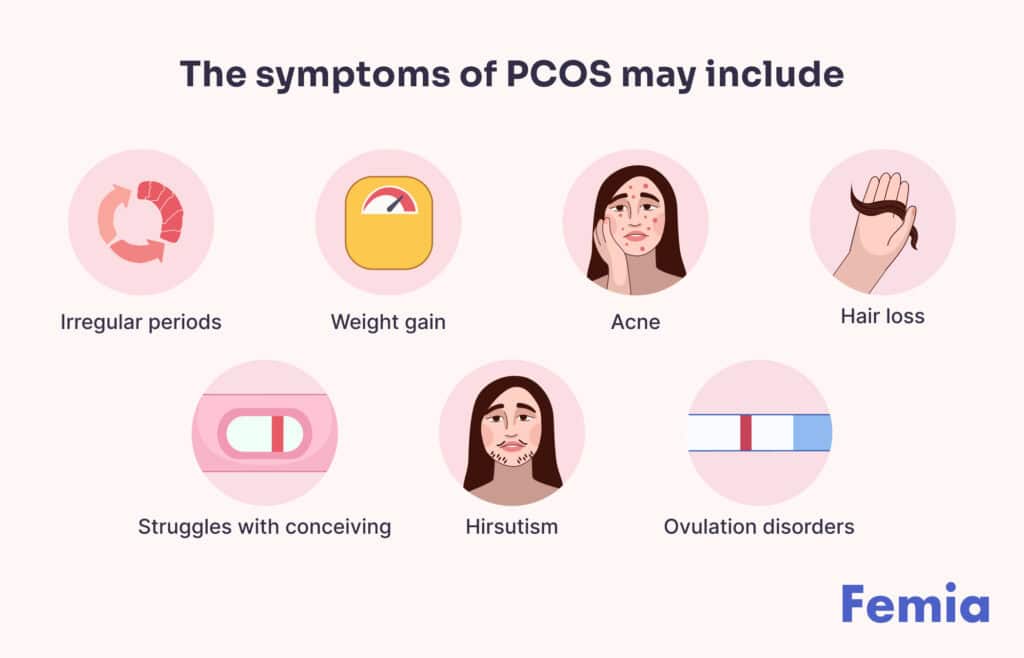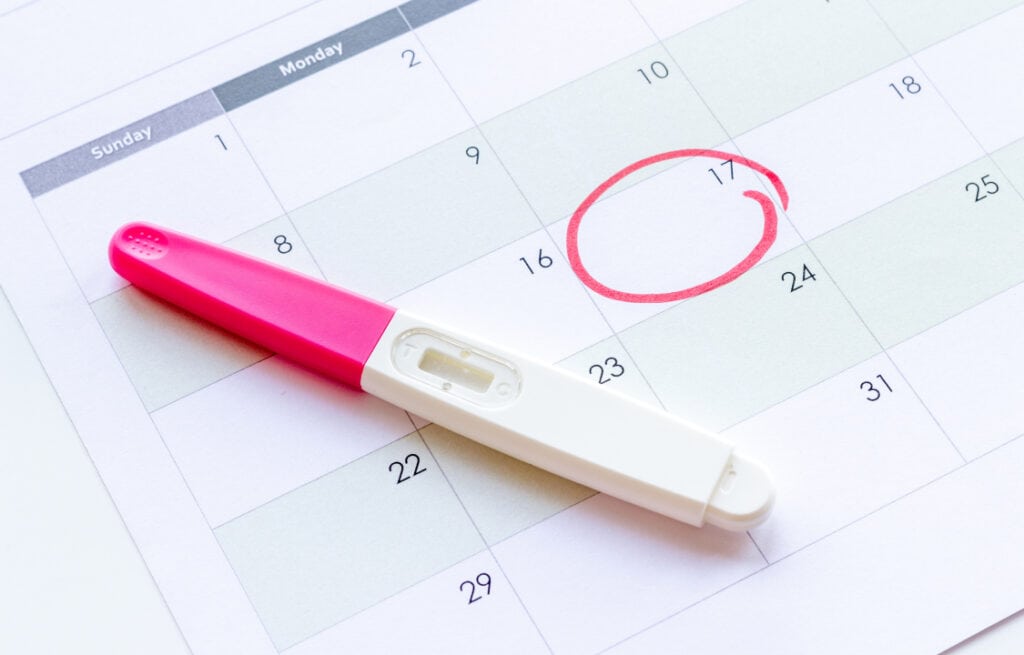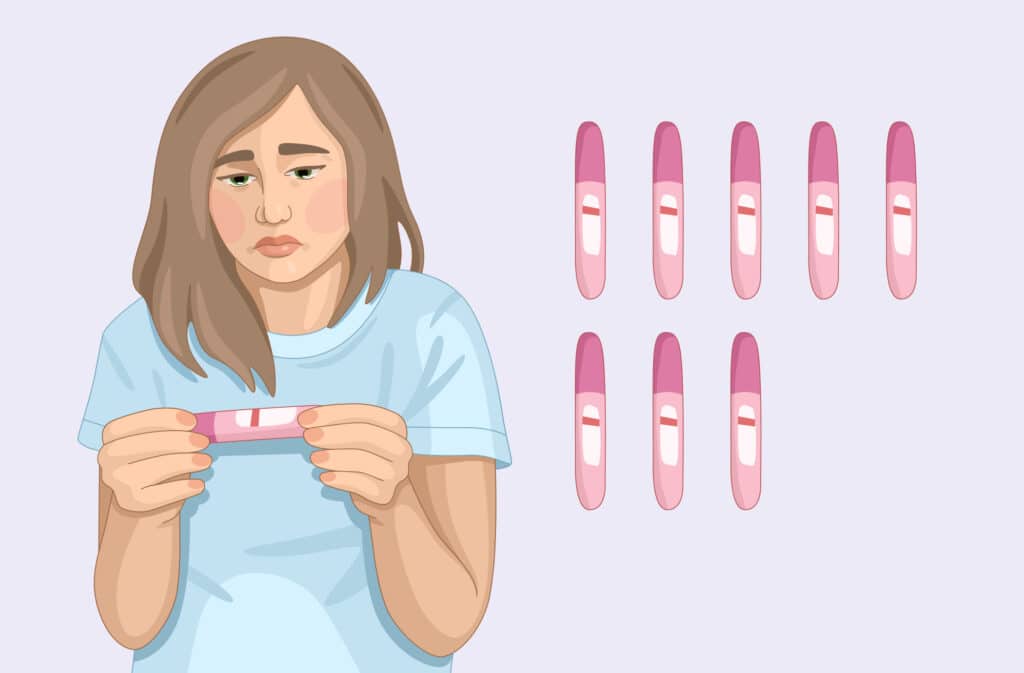Femia > Health Library > Your cycle > Health > PCOS supplements: Best options for weight loss, fertility, and symptom management
PCOS supplements: Best options for weight loss, fertility, and symptom management

- Updated Feb 10, 2025
- Published
CRAFTED BY HUMAN
Crafted by human At Femia, we provide accurate and up-to-date information at every stage of your journey, from trying to conceive, pregnancy and postnatal support. All content is created by a real person based on in-depth research and own professional experience. Femia ensures that you will receive expert advice, strict accuracy and a personalized approach from our authors/medical experts. Learn more about our editorial policy.
FACT CHECKED
Fact checked At Femia Health, we maintain the highest standards of editorial excellence in delivering content focused on helping you conceive, guiding you through pregnancy, and supporting you postpartum. Explore our content review principles to learn how we ensure the accuracy and quality of our health and lifestyle tips for every stage of your journey.
- The hallmark of PCOS is the absence of ovulation and elevated testosterone. This results in struggles with fertility and symptoms such as weight gain, acne, and hair loss.
- Supplements for PCOS, such as inositol, essential vitamins, and omega-3 fatty acids can help with PCOS symptoms, lowering testosterone and improving fertility.
You may have made several changes to your lifestyle in hopes of seeing improvements in your PCOS symptoms. If you aren’t already doing it, one lifestyle change that might help you see improvements in your PCOS symptoms is taking PCOS supplements.
Since PCOS symptoms fluctuate over time, and are different for everyone, PCOS supplements can help improve your unique PCOS symptoms. Specific supplements, such as inositol, can benefit weight loss and improve fertility outcomes.
We will look through some clinically-supported supplements used for managing the most common symptoms of PCOS.
Femia helps you understand your symptoms and when to take action
Why supplements for PCOS?
Symptoms of polycystic ovarian syndrome result from a dysfunction of the ovaries, insulin resistance, and high levels of circulating testosterone. Some of PCOS’ common symptoms include:

- Irregular periods
- Weight gain
- Acne
- Hair loss
- Struggles with conceiving
- Hirsutism
- Ovulation disorders
After a consultation with your doctor, you may be prescribed medications, such as hormonal contraception, and metformin if insulin resistance is confirmed. Metformin is not a mandatory treatment for all women with PCOS, as it is specifically used to address insulin resistance. In addition to medication, your physician may suggest lifestyle changes, including stress management techniques and an exercise routine. Working with a dietitian can also be helpful in adapting a new eating plan, which plays a central role in managing PCOS symptoms and improving overall health.
PCOS supplements are often recommended early on in managing your symptoms and are frequently coupled with the medical treatment you have been prescribed.
Based on the specific symptoms you may be struggling more with, targeted supplement use works best. With the vast array of PCOS supplements available, it can be slightly overwhelming to choose the right ones for you.
👉Find out more: Best age to get pregnant with PCOS: When to start and what you need to know
PCOS supplements for weight loss
Weight gain in PCOS is often linked to insulin resistance, where glucose is not metabolized efficiently, prompting the body to produce more insulin. This excess insulin can elevate androgen levels, which promote fat accumulation, particularly around the abdomen. However, it’s important to note that excess weight in PCOS is not always a direct result of insulin resistance. Women with PCOS can have normal insulin levels, and weight gain may be influenced by other factors, such as metabolic syndrome or genetic predisposition. Abdominal obesity, or fat accumulation around the waist, increases the risk of cardiovascular diseases, making it crucial to address not only weight management but also overall metabolic health.
Inositol
Among the best supplements for PCOS weight loss, inositol is a commonly prescribed supplement. A meta-analysis of 15 clinical trials showed a statistically significant drop in body mass index (BMI) when inositol was used for PCOS weight loss. Inositol’s composition is similar to vitamin B and is found naturally in beans, legumes, meat, and fruit. The active form of inositol, myo-inositol, helps with insulin resistance, which is a key factor in PCOS-related weight gain. However, the best results are often achieved when myo-inositol is combined with D-chiro-inositol in a ratio of 40:1, which reflects their natural balance in the body. This combination has been shown to be more effective in improving insulin sensitivity and regulating hormonal imbalances in women with PCOS.
Omega-3 fatty acids
Omega-3 fatty acids, found in fish, nuts, and avocados, also help with managing your insulin resistance. You can consider adding sources of omega-3 fatty acids to your diet, or take a recommended dose of its supplements for PCOS weight loss after discussing it as an option with your doctor. Additional benefits of taking omega-3 fatty acid supplements include better metabolism of your cholesterol and a reduced risk of heart disease, which is increased in PCOS.
Supplements to lower testosterone in PCOS
Along with insulin resistance, high levels of testosterone are also responsible for most of your PCOS symptoms, such as weight gain, acne, and hair loss. The hormonal imbalance is essentially a vicious cycle, where if one isn’t managed the other is worsened.
Saw palmetto and spearmint tea
Among PCOS supplements, saw palmetto and spearmint tea may help reduce testosterone levels by lowering circulating free testosterone and decreasing the number of active androgen receptors. While these supplements show potential in managing PCOS symptoms, their effectiveness is not fully supported by large-scale, randomized studies. Spearmint tea, in particular, may lower androgen levels, but daily doses of 2-3 cups over several months are typically required to see any noticeable effect. It’s important to remember that while these supplements may offer benefits, their effectiveness is not conclusively proven, and you should always discuss the maximum safe dosage with your healthcare provider before starting any new supplement.
Curcumin
Another PCOS supplement, curcumin, naturally found in turmeric we sprinkle in our curries, has been associated with better glycemic control, essential for PCOS. A review of five randomized-controlled trials, showed curcumin negating androgen pathways through its receptors, decreasing the expression of circulating androgens.
The anti-androgenic properties of these supplements can benefit PCOS symptoms resulting from testosterone elevations. A reduction in testosterone also favors an increase in your natural estrogen and progesterone hormone cycles. However, to achieve therapeutic effects, doses of curcumin from natural sources, such as spices, may be insufficient. It’s recommended to use standardized curcumin supplements under the guidance of a healthcare provider for better effectiveness. Always discuss with your healthcare provider the maximum safe dose of these natural supplements you can use daily.
PCOS hair loss supplements
Essential vitamins and minerals
Additionally, to support better hair growth when your androgen levels decrease, consider supplementing your daily diet with essential vitamins and minerals such as zinc, biotin, and vitamin D. However, it’s important to avoid excessive zinc intake, as too much zinc can be toxic to the body and may cause adverse effects. Always consult your healthcare provider to determine the appropriate dosage of these supplements for your needs. While a lot of these supplements may not drastically increase your hair growth, deficiencies in vitamins such as biotin have been recorded among those women who have hair loss and thinning. Similarly, zinc also supports hair growth as it is a crucial component of its building block, keratin.
PCOS supplements for acne
Similarly, adding probiotics to your daily diet may help with managing PCOS acne. Research suggests that probiotics can reduce inflammation and improve gut microbiome health, which can indirectly influence skin health. While the direct connection between probiotics and acne in PCOS is not yet fully established, incorporating them into your routine alongside medical treatment and a healthy lifestyle can support overall symptom management.
Anti-androgen supplements
Acne is another effect of excess circulating androgens. Similar to managing male-pattern baldness, hormone-balancing PCOS supplements, such as saw palmetto, inositol, and curcumin can help reduce inflammation, insulin resistance and testosterone levels.
Probiotics
Since acne results from hyperandrogenic oil production, clogged pores, and possible bacterial growth on your skin, improving your immunity can also help lower PCOS acne breakout. A way to do this is to increase the probiotics consumed in your diet. This can reduce bacterial count on your skin, reducing acne breakout. While studies supporting probiotics’ direct impact on acne are still ongoing, some research suggests that probiotics can influence gut health and may indirectly affect insulin resistance, potentially improving acne over time. However, there is no specific probiotic proven to directly reduce acne. Dysbiosis of your gut has also been known to contribute to PCOS insulin resistance, so the additional probiotics in your diet have numerous benefits for your PCOS symptoms.
Antioxidants
Zinc, magnesium, and antioxidants such as N-acetylcysteine are also beneficial as PCOS acne supplements. The increased oxidative stress caused by inflammation and bacterial action leading to acne can benefit from the detoxification process through glutathione production following the use of N-acetylcysteine. The anti-inflammatory benefits of NAC can also help improve insulin resistance and improve hormonal regulation favoring ovulation.
PCOS supplements for fertility
Inositol
Often high on the list of primary concerns of PCOS is its impact on your fertility. Among the PCOS supplements regularly prescribed, inositol tops the list of its benefits to your fertility. Myo-inositol improves egg maturation, pregnancy rates, and hormonal balance. With lowering testosterone and improving insulin resistance, inositol supplementation naturally improves fertility hormones required for conceiving.
Folic acid
At your next visit be sure to inform your healthcare consultant if you are planning to get pregnant, as you will be started on a supplementation of folic acid as well. Early folic acid supplementation is crucial for the early development of your baby’s nervous system when you conceive. While there is no direct connection to improved fertility, folic acid has been linked to lowering BMI among PCOS patients, favoring an improvement in fertility outcomes when supplemented with inositol.
One of the first signs that supplements for PCOS might be helping you, is a restart of regular menstrual cycles, signaling a start of ovulation as well. Sometimes taking PCOS supplements may favor conception at your next ovulation, even before your periods come back.
👉Find out more: PCOS diet: Best foods, meal plans, and tips for managing PCOS symptoms and weight loss
Vitamin D as a supplement for PCOS
A study of 256 women with PCOS recorded almost 90% of them as having low levels of vitamin D. This vitamin is essential for many interlinking reproductive functions such as managing insulin sensitivity, follicular development, progesterone production, and regulating expression of anti-Mullerian hormone (AMH).
Similarly, a 2011 study published in the Journal of Endocrinological Investigation, studied the effect of a 24-week vitamin D supplementation on women with PCOS. 80% of these women who previously had oligomenorrhea or menstrual disturbances, recorded an improvement in their menstrual regularity following supplementation of vitamin D.
Taking vitamin D as a PCOS supplement, especially if you are deficient, can help improve symptoms and increase your chances of conceiving.
Consulting a healthcare provider
While most of your PCOS supplements are safe to take, primarily because of their natural composition, it is still important to check in with your healthcare provider before you decide to add them to your PCOS treatment regime.
From what we have seen, inositol is the best supplement, having multiple functions in PCOS improving symptoms such as weight gain, and improving fertility. PCOS supplements such as inositol often need a prescription and may require specific doses if combined with other supplements.
When taking natural herbal supplements it is also important to let your doctor know, as many ingredients may interact with your diet or medications you are taking. Certain supplements work best for specific PCOS symptoms, so taking too many supplements providing a similar effect, may not be beneficial for the overall outcome. Your healthcare provider will regularly assess your progress while you’re taking supplements for PCOS. It’s important to remember that dietary supplements are meant to complement, not replace, the primary treatment for PCOS. Your doctor is the only one who can provide you with personalized recommendations after evaluating your condition and reviewing any relevant tests.
Femia helps you understand your symptoms and when to take action
Questions from the Femia community
How long will my PCOS supplements take to show results?
Based on your particular symptoms and their severity, the results from PCOS supplementation can vary. For some, it may appear within two to three months, while for others it can take longer. Be sure to report any adverse effects you notice.
Can I take multiple PCOS supplements at once?
Since a lot of the supplements are natural vitamins, minerals, or herbs, they are generally safe to take, even in combinations. However, before you start any supplements it is ideal to consult with your healthcare provider to understand your daily doses, and if your supplements are likely to interact with food or medications you are taking.
Are there any side effects of taking PCOS supplements?
Some supplements, especially taken in excess can result in common adverse effects such as headache, stomach upsets, gas, or nausea which subside on their own. Talk to your doctor about alternatives if you experience side effects. More serious and persistent adverse effects require immediate medical attention.
Can supplements replace medication for my PCOS symptoms?
Medications, unlike a lot of supplements, are clinically proven to improve underlying dysfunction in metabolism, responsible for your PCOS symptoms. Supplements have shown some promise in improving PCOS symptoms. This is why they are used to supplement medication and lifestyle changes, which remain the cornerstones of PCOS management.
The bottom line
With the variety of PCOS supplements available, weighing the benefits of each, in addition to the lifestyle changes you have already made can be slightly tricky. Since most of the supplements, such as inositol, saw palmetto, curcumin, zinc, and vitamin D are naturally occurring it may seem harmless to take them all at once.
However, your PCOS supplementation differs based on your requirements such as improving testosterone levels (for acne, hair loss, weight gain), improving your glucose levels, or increasing your chances of conceiving. Speak with your healthcare provider about which combination of supplements will work best for your individualized symptoms.
References
- Zarezadeh, Meysam, et al. “Inositol Supplementation and Body Mass Index: A Systematic Review and Meta‐analysis of Randomized Clinical Trials.” Obesity Science & Practice, vol. 8, no. 3, Oct. 2021, pp. 387–97. https://doi.org/10.1002/osp4.569.
- Yang, Kailin, et al. “Effectiveness of Omega-3 Fatty Acid for Polycystic Ovary Syndrome: A Systematic Review and Meta-analysis.” Reproductive Biology and Endocrinology, vol. 16, no. 1, Mar. 2018, https://doi.org/10.1186/s12958-018-0346-x.
- Zeng, Xin, et al. “Polycystic Ovarian Syndrome: Correlation Between Hyperandrogenism, Insulin Resistance and Obesity.” Clinica Chimica Acta, vol. 502, Nov. 2019, pp. 214–21. https://doi.org/10.1016/j.cca.2019.11.003.
- Grant, Paul. “Spearmint Herbal Tea Has Significant Anti‐androgen Effects in Polycystic Ovarian Syndrome. A Randomized Controlled Trial.” Phytotherapy Research, vol. 24, no. 2, July 2009, pp. 186–88. https://doi.org/10.1002/ptr.2900.
- National Academies Press (US). “Prototype Focused Monograph: Review of Antiandrogenic Risks of Saw Palmetto Ingestion by Women.” Dietary Supplements – NCBI Bookshelf, 2005, www.ncbi.nlm.nih.gov/books/NBK216069.
- Abdelazeem, Basel, et al. “The Effects of Curcumin as Dietary Supplement for Patients With Polycystic Ovary Syndrome: An Updated Systematic Review and Meta‐analysis of Randomized Clinical Trials.” Phytotherapy Research, vol. 36, no. 1, Sept. 2021, pp. 22–32. https://doi.org/10.1002/ptr.7274.
- Kober, Mary-Margaret, and Whitney P. Bowe. “The Effect of Probiotics on Immune Regulation, Acne, and Photoaging.” International Journal of Women’s Dermatology, vol. 1, no. 2, May 2015, pp. 85–89. https://doi.org/10.1016/j.ijwd.2015.02.001.
- He, Fang-Fang, and Yu-Mei Li. “Role of Gut Microbiota in the Development of Insulin Resistance and the Mechanism Underlying Polycystic Ovary Syndrome: A Review.” Journal of Ovarian Research, vol. 13, no. 1, June 2020, https://doi.org/10.1186/s13048-020-00670-3.
- Mardani, Nafiseh, et al. “A Systematic Review of N‐acetylcysteine for Treatment of Acne Vulgaris and Acne‐related Associations and Consequences: Focus on Clinical Studies.” Dermatologic Therapy, vol. 34, no. 3, Feb. 2021, https://doi.org/10.1111/dth.14915.
- Unfer, V., et al. “Effects of Myo-inositol in Women With PCOS: A Systematic Review of Randomized Controlled Trials.” Gynecological Endocrinology, vol. 28, no. 7, Feb. 2012, pp. 509–15. https://doi.org/10.3109/09513590.2011.650660.
- Han, Ya, et al. “Dietary Supplements in Polycystic Ovary Syndrome–Current Evidence.” Frontiers in Endocrinology, vol. 15, Sept. 2024, https://doi.org/10.3389/fendo.2024.1456571.
- Mogili, Krishna Deepti, et al. “Prevalence of Vitamin D Deficiency in Infertile Women With Polycystic Ovarian Syndrome and Its Association With Metabolic Syndrome – a Prospective Observational Study.” European Journal of Obstetrics & Gynecology and Reproductive Biology, vol. 229, Aug. 2018, pp. 15–19. https://doi.org/10.1016/j.ejogrb.2018.08.001.
- Mohan, Anmol, et al. “Vitamin D and Polycystic Ovary Syndrome (PCOS): A Review.” Annals of Medicine and Surgery, vol. 85, no. 7, June 2023, pp. 3506–11. https://doi.org/10.1097/ms9.0000000000000879.
- Wehr, E., et al. “Effect of Vitamin D3 Treatment on Glucose Metabolism and Menstrual Frequency in Polycystic Ovary Syndrome Women: A Pilot Study.” PubMed, Nov. 2011, https://doi.org/10.3275/7748.

Learn if you can get pregnant without a period. Discover how ovulation works and the factors that can affect fertility with irregular menstrual cycles.

Discover a detailed week-by-week pregnancy checklist to ensure you’re fully prepared for your baby’s arrival. From initial preparations to postpartum care, we’ve got you covered.

Learn about female infertility, including common causes, how to know if you’re infertile, and what treatment options are available. Find support and guidance for your fertility journey.

